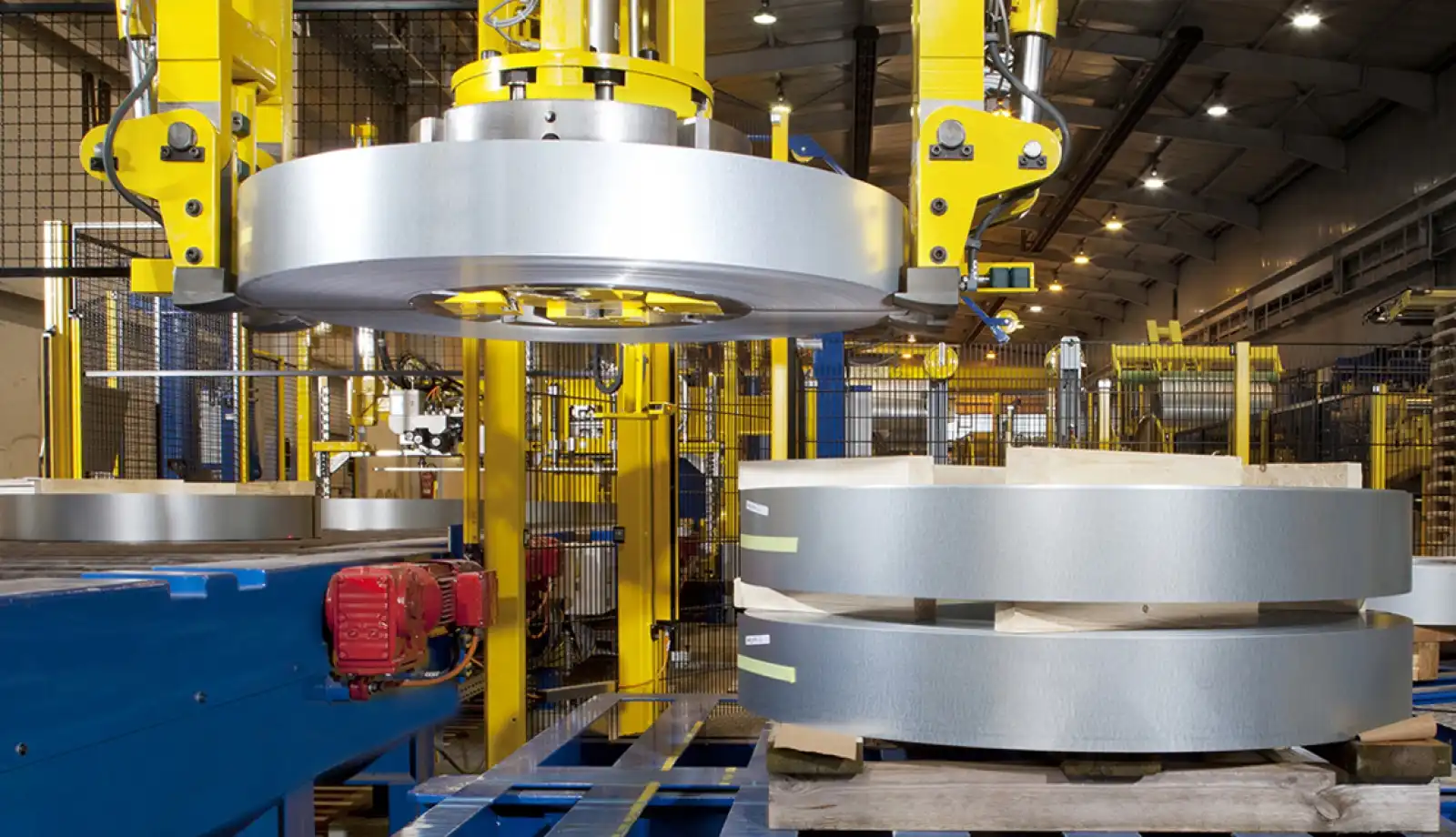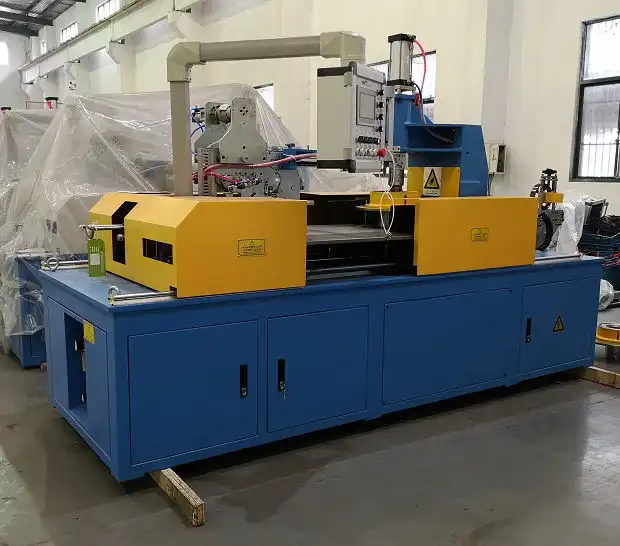Understanding the Role of Automatic Coil Strapping in Manufacturing
Are you grappling with slow, inconsistent coil packaging? Tired of product damage and high labor costs from manual strapping? It’s time to confront the challenges of outdated methods head-on. Manual coil strapping creates bottlenecks and jeopardizes product integrity, costing you time and money.
Automatic coil strapping machines significantly enhance manufacturing by automating the process of securing metal coils. They ensure consistent tension, boost packaging speed, reduce labor costs, and minimize product damage during handling and transportation. This automation streamlines production lines and improves overall operational efficiency and safety.
Dive deeper into how this technology is transforming packaging operations, offering tangible benefits from the factory floor to the customer’s doorstep.
Enhanced Efficiency and Throughput
Is your production line being held back by the pace of manual packaging? The bottleneck created by slow, inconsistent manual strapping methods directly impacts your overall throughput, limiting how much product you can process and ship. This inefficiency can lead to delayed orders and unsatisfied customers.
Automatic coil strapping machines drastically increase packaging speed, consistently applying straps in seconds, which significantly increases throughput and reduces bottlenecks in slit coil processing lines. They automate the feeding, tensioning, and sealing processes, performing these tasks with precision and speed unmatched by manual labor. This reliability ensures a steady, high volume of packaged coils.

Streamlining Operations with Automation
Automatic strapping machines for metal coils are specifically engineered to integrate smoothly into modern manufacturing workflows. They eliminate the need for tedious manual steps, executing complex strapping patterns quickly and accurately. Comparing manual and automatic methods reveals stark differences in efficiency.
- Speed: Automatic machines strap coils significantly faster, often in seconds, compared to several minutes for manual methods.
- Consistency: Machine tensioning is uniform and repeatable, unlike variable manual tension which depends on operator skill and fatigue.
- Labor: Automatic systems require minimal operator oversight, freeing personnel for other tasks, while manual strapping is labor-intensive.
- Throughput: Automation directly increases the volume of coils that can be processed per hour.
- Material Waste: Optimized strap usage with automatic cut-off mechanisms reduces material waste compared to manual methods.
- Safety: Automating hazardous tasks reduces the risk of operator injuries.
This operational data highlights the clear advantages of automation. Higher speed and consistency mean more coils processed faster, directly boosting production capacity. Reduced labor and material waste contribute to a healthier bottom line. Machines designed for coils include features like gentle handling, adjustable tension for different materials (steel, aluminum), customizable strap patterns (eye, radial), and seamless integration with conveyors or tilters, providing a tailored solution for coil packaging.
Enhanced Product Protection and Reduced Damage
Are you losing valuable product to damage during handling and shipping? Delicate metal coils, whether thin gauge steel or aluminum, are highly susceptible to damage from improper or inconsistent strapping. Telescoping, edge damage, and unwinding can turn perfect product into costly scrap.
Automatic strapping machines apply precise and consistent tension, providing superior load stability and minimizing the risk of damage to slit coils during handling, storage, and transportation. This unwavering consistency prevents issues like telescoping or edge damage that are common with variable manual tension, safeguarding product quality and value.
Ensuring Coil Integrity with Precision
Protecting metal coils is paramount, and inconsistent strapping is a major culprit behind product damage. Automatic machines eliminate this variability with advanced tension control systems. Each strap is applied with the exact, pre-set force, ensuring uniform pressure across the coil. This consistent tension is the backbone of secure coil packaging.
Let’s look at how consistent tension impacts product safety:
| Feature | Inconsistent Manual Strapping | Consistent Automatic Strapping |
|---|---|---|
| Coil Stability | Prone to telescoping, unwinding | Highly stable, minimized telescoping |
| Edge Protection | Risk of damage from over-tightening | Reduced edge damage, precise tension control |
| Transit Security | Potential for shifting, strap loosening | Secure loads, straps maintain tension |
| Damage Rate | Higher, due to inconsistent securement | Lower, significantly reduced product damage |
| Customer Satisfaction | Potential for damaged goods, complaints | Improved product arrival condition, satisfaction |
Beyond tension control, automation minimizes damage through:
- Precise Placement: Machines accurately position straps for maximum support without harming edges.
- Gentle Handling: Automated systems often incorporate mechanisms that handle coils gently.
- Reduced Manual Touchpoints: Less human handling means fewer accidental drops or impacts.
- Improved Package Integrity: Consistently strapped packages are more robust and less likely to fail during transit, protecting coils from environmental factors and load shifts.
By automating strapping, manufacturers implement a comprehensive approach to coil protection, drastically reducing damage rates and preserving the value of their goods throughout the supply chain.
Cost Savings and Labor Reduction
Is manual coil strapping inflating your operational expenses? The hidden costs of labor-intensive processes, material waste, and product damage from inconsistent manual methods can significantly impact profitability. Multiple operators are often needed, and errors lead to expensive rework or scrap.
Automatic strapping machines reduce labor costs by automating the strapping process, freeing up personnel for more value-added tasks, while minimizing material waste and damage-related expenses, leading to a significant return on investment. The initial investment is quickly offset by ongoing operational savings and improved efficiency.
Quantifying the Economic Advantages
The shift from manual to automatic coil strapping translates into tangible financial benefits across several operational areas.
| Cost Factor | Manual Strapping | Automatic Strapping |
|---|---|---|
| Labor Costs | High, multiple operators needed | Low, minimal operator oversight |
| Material Waste | Potential for strap over-usage, scrap | Optimized strap consumption, reduced scrap |
| Damage Costs | High, product damage risk, returns | Low, reduced damage incidence, fewer claims |
| Throughput Costs | Lower throughput, slower cycle times | Higher throughput, faster cycle times |
| Operational Efficiency | Lower, manual process limitations | Higher, automated, streamlined process |
| Long-Term ROI | Lower, limited savings potential | Higher, significant cost reductions |
| Rework/Scrap | Higher, due to inconsistent application | Lower, consistent quality |
| Safety Costs | Higher, potential for workplace injuries | Lower, reduced manual handling risks |
The reduction in labor costs is immediate and substantial. Fewer operators are needed for the strapping process itself. Optimized material usage, ensuring precise strap length and tension, minimizes waste. However, the most significant financial impact often comes from the dramatic decrease in product damage, avoiding the costs of rework, scrap, shipping returns, and customer claims. The increased throughput also means more product moved with the same or less overhead. Furthermore, redirecting skilled labor from repetitive strapping to tasks like quality control, maintenance, or process optimization leverages human capital more effectively, contributing to overall productivity and competitiveness.
Improved Workplace Safety
Manual coil strapping exposes workers to numerous hazards. Handling heavy, awkward coils and using manual tools can lead to strains, cuts, and other injuries. The inherent inconsistency of manual methods can result in unstable loads, posing risks during stacking, transport, and unbanding.
Automatic strapping machines significantly enhance workplace safety by automating hazardous manual tasks, reducing the risk of operator injuries1 associated with heavy lifting, repetitive motions, and manual strapping tool operation, while ensuring consistently secure loads. Automatic coil strapping machines2 significantly enhance manufacturing by automating the process of securing metal coils3. They ensure consistent tension, boost packaging speed, reduce labor costs, and minimize product damage during handling and transportation. This automation streamlines production lines and improves overall operational efficiency and safety. They remove the operator from the immediate vicinity of the heavy coil and the sharp strapping material during the tensioning and sealing process. Automated systems perform these functions reliably, minimizing the need for manual intervention. Consistent, machine-applied strapping also creates more stable packages, drastically reducing the risk of load shifts or collapse during handling and transportation. Investing in automatic strapping is not just an operational upgrade; it’s a crucial step towards creating a safer environment for your workforce, reducing potential for accidents, and lowering associated costs and liabilities. This focus on safety contributes to a more reliable and sustainable manufacturing operation.
Conclusion
Automatic coil strapping machines are a vital investment for modern manufacturing, offering significant benefits in efficiency, product protection, cost reduction, and safety. By automating the packaging process, businesses can achieve consistent, high-speed securement, minimize product damage, lower labor expenses, and create a safer working environment. Adopting automatic coil strapping solutions is essential for optimizing packaging operations and maintaining competitiveness. Explore advanced coil packing line options to revolutionize your manufacturing output.
-
Discover effective strategies to enhance workplace safety and minimize operator injuries in manufacturing environments. ↩
-
Explore how Automatic coil strapping machines can revolutionize your manufacturing process by enhancing safety and efficiency. ↩
-
Learn about the advantages of automating coil securing processes to boost productivity and reduce costs. ↩

